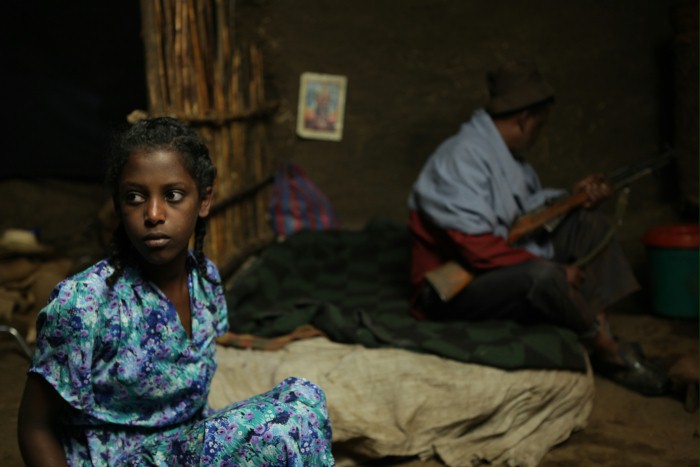Title: Difret
Written and Directed by Zeresenay Berhane Mehari
Starring: Meron Getnet, Tizita Hagere, Harege Woin, Shetaye Abreha, Mekonen Laeake, Meaza Tekle.
Angelina Jolie epitomises the humanitarian filmmaker, always attentive to socially relevant projects. Therefore it won’t surprise to see that she served as executive producer of 2014’s Ethiopian drama film that was selected as the country’s entry for Best Foreign Language Film at the 87th Academy Awards, besides winning the the World Cinematic Dramatic Audience Award at Sundance Film Festival and the Audience Award at the Panorama section at the 64th Berlin International Film Festival.
‘Difret’ is based on a true story. A true cultural battle for the female gender. It chronicles a legal-precedent setting court case that outlawed the kidnapping of child brides in Ethiopia, through the story of 14-year old Hirut Assefa, who was captured on her way home from school and raped by a man of her village who wanted to marry her. The young girl grabbed a rifle that was left unguarded and tried to escape, but ended up shooting her would-be husband. In her village, the practice of abduction into marriage is common and one of Ethiopia’s oldest traditions. The girl, facing a possible death sentence, was subsequently defended by a female lawyer from the capital who argued, in a court in Addis Abeba, that her actions were in self-defence: Meaza Ashenafi, founder of the Ethiopian Women Lawyers Association – who was awarded in 2003 the Africa Prize to Leadership (often referred to as the “Nobel Prize for Africa”), in recognition of EWLA’s commitment to women’s rights in Africa and was also nominated for the Nobel Peace Prize in 2005.
The movie at first may seem rudimental at a technical level, but Zeresenay Berhane Mehari’s decision to shoot in 35mm enhances the archaicness of “Telefa” (abduction with the purpose of marriage). This Ethiopian tradition, that involves 40% of adolescent girls according to a law of 1957, allowed the kidnapper not to be condemned if he married the girl he raped. But Hirut’s story triggered the government to change the law in 2004 punishing the abductor and raper with a reclusion sentence that can last up to 15 years.
The cast has approached with utmost respect and truthfulness this subject matter. Especially the two female protagonists. Meron Getnet, who is a poet with already seven features in her filmography and is the most sought actress of her generation, interprets Meaza majestically. Her cultural background transpires in the role she plays, since she graduated in Art and Theatre and was getting her Masters degree in Art and Development while working on ‘Difret.’ Just as outstanding is the 13-year old Tizita Hagere, playing Hiruta who was discovered during a workshop for the casting of the film. Despite she had no previous acting experience, she brilliantly embraced the challenge of playing the young and courageous girl, with whom she shared some life experiences, like living in an orphanage.
The incredible orchestration by Zeresenay Berhane Mehari is harrowingly beautiful in the way the story of 1996 is accounted in earnest and simplicity. Just as meaningful is the choice of the title for it’s ambivalence: ‘Difret’ – means “courage” or “to dare” in Amharic, the national language of Ethiopia, but it also means rape. This word resonates as the outcry of all women who are fighting against disrespectful traditions to conquer their dignity as human beings.
Technical: B
Acting: A
Story: A+
Overall: A
Written by: Chiara Spagnoli Gabardi

